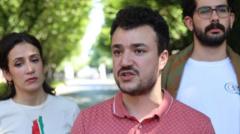Renowned scholar Yehuda Bauer, who dedicated his life to Holocaust research and challenging the narrative of Jewish victimhood, died in Jerusalem at the age of 98. His insights critically transformed historical discourse surrounding Jewish resistance.
Yehuda Bauer: Pioneering Scholar of the Holocaust Passes Away at 98

Yehuda Bauer: Pioneering Scholar of the Holocaust Passes Away at 98
Yehuda Bauer, a significant figure in Holocaust studies, has died, leaving behind a legacy that reshaped our understanding of Jewish resistance during the Nazi era.
Yehuda Bauer, an eminent Israeli scholar whose profound work reshaped the understanding of the Holocaust and the Jewish experience during that era, passed away on Friday at his home in Jerusalem. He was 98 years old. His daughter, Anat Tsach, confirmed the news of his death, emphasizing the impact he had on the field of Holocaust studies.
Bauer’s personal history marked his scholarly journey; his family narrowly escaped the terror of the Nazis during their flight from Czechoslovakia to Mandatory Palestine in 1939. Initially, he had little intention to study the Holocaust, preferring instead to focus on contemporary Israeli history. However, a significant conversation in 1964 with Abba Kovner—notable for his fight against the Nazis as a partisan—changed his course, guiding him toward Holocaust studies.
For many years after World War II, academic inquiry into the Holocaust was stifled by various factors, including geopolitical motivations that prioritized stability over historical reckoning. Survivors of the Holocaust were often portrayed solely as victims, a narrative that did not entirely capture the complete spectrum of their experiences. It wasn't until 1961, with the publication of Raul Hilberg’s foundational work, "The Destruction of the European Jews," that serious scholarly attention began to focus on the mechanics of the Holocaust.
Despite this, Bauer felt that Hilberg's perspective was too narrowly focused on the perpetrators and did little justice to the Jewish resistance. He recognized a crucial need to explore Jewish agency during the Holocaust and became instrumental in leading a new wave of scholars dedicated to this mission. Menachem Rosensaft, a professor at Cornell Law School and a contemporary of Bauer, noted that Bauer's work helped clarify that Jews did not passively succumb to genocide, but rather fought back against their oppressors.
Through his influential scholarly contributions, Bauer not only educated students and historians but also engaged broader audiences, shaping public discourse on one of history’s darkest chapters. His academic legacy ensures that future generations will continue to unpack and understand the complex dynamics of resistance and resilience exhibited by the Jewish community during the Holocaust.






















